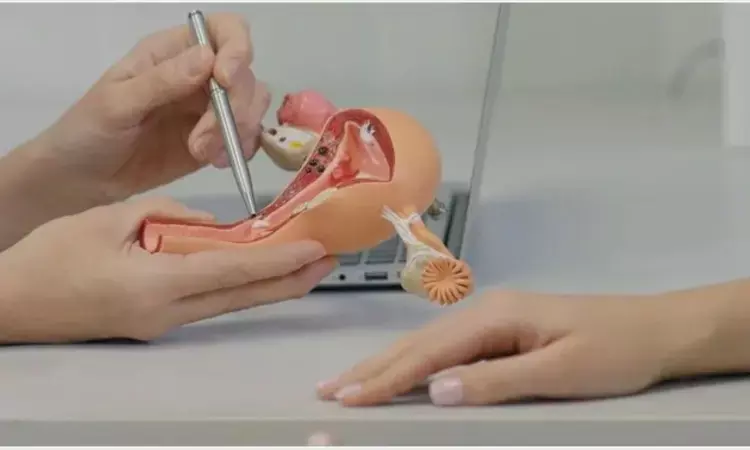- Home
- Medical news & Guidelines
- Anesthesiology
- Cardiology and CTVS
- Critical Care
- Dentistry
- Dermatology
- Diabetes and Endocrinology
- ENT
- Gastroenterology
- Medicine
- Nephrology
- Neurology
- Obstretics-Gynaecology
- Oncology
- Ophthalmology
- Orthopaedics
- Pediatrics-Neonatology
- Psychiatry
- Pulmonology
- Radiology
- Surgery
- Urology
- Laboratory Medicine
- Diet
- Nursing
- Paramedical
- Physiotherapy
- Health news
- Fact Check
- Bone Health Fact Check
- Brain Health Fact Check
- Cancer Related Fact Check
- Child Care Fact Check
- Dental and oral health fact check
- Diabetes and metabolic health fact check
- Diet and Nutrition Fact Check
- Eye and ENT Care Fact Check
- Fitness fact check
- Gut health fact check
- Heart health fact check
- Kidney health fact check
- Medical education fact check
- Men's health fact check
- Respiratory fact check
- Skin and hair care fact check
- Vaccine and Immunization fact check
- Women's health fact check
- AYUSH
- State News
- Andaman and Nicobar Islands
- Andhra Pradesh
- Arunachal Pradesh
- Assam
- Bihar
- Chandigarh
- Chattisgarh
- Dadra and Nagar Haveli
- Daman and Diu
- Delhi
- Goa
- Gujarat
- Haryana
- Himachal Pradesh
- Jammu & Kashmir
- Jharkhand
- Karnataka
- Kerala
- Ladakh
- Lakshadweep
- Madhya Pradesh
- Maharashtra
- Manipur
- Meghalaya
- Mizoram
- Nagaland
- Odisha
- Puducherry
- Punjab
- Rajasthan
- Sikkim
- Tamil Nadu
- Telangana
- Tripura
- Uttar Pradesh
- Uttrakhand
- West Bengal
- Medical Education
- Industry
Simple hysterectomy non-inferior to radical hysterectomy for pelvic recurrence in women with low-risk cervical cancer: NEJM

Canada: A recent study published in the New England Journal of Medicine compared simple versus radical hysterectomy in women with low-risk cervical cancer.
The researchers found simple hysterectomy to be not inferior to radical hysterectomy concerning the 3-year incidence of pelvic recurrence in patients with low-risk cervical cancer. A simple hysterectomy was linked with a reduced risk of urinary incontinence or retention.
Retrospective data indicate that parametrial infiltration incidence is low in women with early-stage low-risk cervical cancer, which raises questions regarding the need for radical hysterectomy in these patients. However, there is a lack of data from large, randomized trials comparing outcomes of radical and simple hysterectomy.
To fill this knowledge gap, Marie Plante, the University of British Columbia, Vancouver, Canada, and colleagues conducted a multicenter, randomized, noninferiority trial comparing radical hysterectomy with simple hysterectomy including lymph-node assessment in patients with low-risk cervical cancer (lesions of ≤2 cm with limited stromal invasion).
The study's primary outcome was cancer recurrence in the pelvic area (pelvic recurrence) at three years. The prespecified noninferiority margin for the between-group difference in pelvic recurrence at three years was 4 percentage points.
Based on the study, the researchers reported the following findings:
- Among 700 patients who underwent randomization (350 in each group), the majority had tumours that were stage IB1 according to the 2009 International Federation of Gynecology and Obstetrics (FIGO) criteria (91.7%), that had squamous-cell histologic features (61.7%), and that were grade 1 or 2 (59.3%).
- With a median follow-up time of 4.5 years, the incidence of pelvic recurrence at 3 years was 2.17% in the radical hysterectomy group and 2.52% in the simple hysterectomy group. Results were similar in a per-protocol analysis.
- The incidence of urinary incontinence was lower in the simple hysterectomy group than in the radical hysterectomy group within 4 weeks after surgery (2.4% vs. 5.5%) and beyond 4 weeks (4.7% vs. 11.0%).
- The incidence of urinary retention in the simple hysterectomy group was also lower than that in the radical hysterectomy group within 4 weeks after surgery (0.6% vs. 11.0%) and beyond 4 weeks (0.6% vs. 9.9%).
"In patients with low-risk cervical cancer, simple hysterectomy was not inferior to radical hysterectomy concerning the 3-year incidence of pelvic recurrence and was linked with a lower risk of urinary incontinence or retention," the researchers wrote.
"The study findings challenge our current standards and provide evidence that in selected patients, simple hysterectomy appears to be safe, yielding oncologic outcomes similar to those of radical hysterectomy, but due to the specificity of the disease and patient factors certain points require additional analysis," Pedro T. Ramirez, MD, chair of the department of obstetrics and gynaecology at Houston Methodist Hospital, wrote in an accompanying editorial.
He added, "It is critical to ensure that simple hysterectomy use is limited to patients having low-risk tumours and meeting the eligibility criteria for this conservative approach. Patients who do not meet such inclusion criteria should continue to be offered radical hysterectomy."
Reference:
Plante M, Kwon JS, Ferguson S, Samouëlian V, Ferron G, Maulard A, de Kroon C, Van Driel W, Tidy J, Williamson K, Mahner S, Kommoss S, Goffin F, Tamussino K, Eyjólfsdóttir B, Kim JW, Gleeson N, Brotto L, Tu D, Shepherd LE; CX.5 SHAPE investigators; CX.5 SHAPE Investigators. Simple versus Radical Hysterectomy in Women with Low-Risk Cervical Cancer. N Engl J Med. 2024 Feb 29;390(9):819-829. doi: 10.1056/NEJMoa2308900. PMID: 38416430.
Dr Kamal Kant Kohli-MBBS, DTCD- a chest specialist with more than 30 years of practice and a flair for writing clinical articles, Dr Kamal Kant Kohli joined Medical Dialogues as a Chief Editor of Medical News. Besides writing articles, as an editor, he proofreads and verifies all the medical content published on Medical Dialogues including those coming from journals, studies,medical conferences,guidelines etc. Email: drkohli@medicaldialogues.in. Contact no. 011-43720751


